Originally posted: May 11, 2020
Last updated: September 1, 2021
As we finalized this library, the COVID-19 pandemic changed the context for work and workers dramatically. But approaches to strengthen job quality are more important than ever—both in the short-term to support worker relief and safety, and in the long term to build a more inclusive economy.
We created this special page to help practitioners respond in the short-term and have begun gathering tools and resources developed by a range of organizations in response to the crisis. Content is organized in four areas: worker health and safety, financial and other supports for workers, policy and workers’ rights, and monitoring and supporting businesses.
We will update this page as we find helpful resources and note the date of latest update. Please let us know about other tools and resources related to COVID-19 response that you’ve found helpful.
↓ Tools and Resources Below the Box ↓
Worker Health & Safety

Who’s It For: Employers, Economic Development, Investing and Lending, Workforce Development
What’s It For: This resource provides guidance related to seven health and safety questions that small businesses have grappled with since the start of the pandemic. For each question, the authors include practical information, examples of steps taken by other small businesses, and links to helpful resources. Topics covered include creating an equitable and inclusive environment, recognizing and responding to worker’ caregiving responsibilities, and communicating about and ensuring workplace safety. Although written for small business owners, this resource may also be useful for larger employers as well as individuals that work with businesses, including economic development, investing and lending, and workforce development professionals.
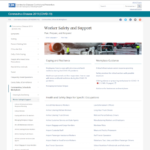
Who’s It For: Employers, Economic Development, Worker Advocacy, Workforce Development
What’s It For: The Centers for Disease Control and Prevention provides up-to-date worker safety guidance related to the COVID-19 outbreak. The site includes occupation-specific safety and health guidance, how to manage fatigue and stress on the job, printable flyers for workplaces, and information about the Coronavirus disease. Employers and worker support organizations will find this resource useful for identifying guidance to help protect essential workers’ health.
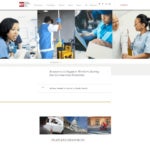
National Employment Law Project – Resources to Support Workers During the Coronavirus Pandemic
Who’s It For: Employers, Economic Development, Policy, Worker Advocacy, Workforce Development
What’s It For: NELP has developed a compendium of resources for workers and worker-serving organizations, including a toolkit on worker safety and health during the COVID-19 pandemic. The toolkit provides key information and resources about how the virus spreads, workplace safety rights, and voluntary guidance employers can adopt to protect workers.

PHI – We Surveyed our Stakeholders on COVID-19. Here’s What We Learned
Who’s It For: Employers, Policy, Worker Advocacy, Workforce Development
What’s It For: This blog post from PHI draws on survey data from long-term care employers, workers, and other stakeholders to identify responses to support long-term care workers confronting the Covid-19 crisis. The blog includes guidance for both policymakers and long-term care employers, including ways to keep workers safe on the job. It also highlights steps long-term care employers can take to maintain a supportive work environment.
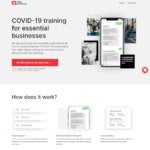
StopCOVID-19 – StopCOVID Training
Who’s It For: Employers, Worker Advocacy, Workforce Development
What’s It For: This training tool is designed for organizations to educate frontline workers about best practices to prevent the spread of COVID-19. It contains practical information organized in eight short training drills. The training, delivered via mobile phone texts, provides safety, disinfecting, and personal hygiene guidance. Training is available in English, Spanish, and French. The trainings are based on the latest guidelines from the World Health Organization and Centers for Disease Control and Prevention, and updated regularly as new information becomes available. StopCOVID is powered by ESLWorks, the leading provider of mobile, job-focused training for frontline employees working up and down the supply chain.
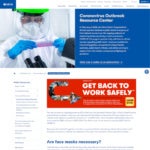
AIHA – Coronavirus Outbreak Resource Center
Who’s It For: Employers, Policy, Worker Advocacy, Workforce Development
What’s It For: This resource center provides industry-specific guidance for maintaining healthy and safe workplaces during the COVID-19 pandemic. Included are guidelines for cleaning workplaces, how to re-open workplaces safely, and important information about Personal Protective Equipment (PPE). Resources are updated as information evolves. The resource center has application for employers and worker support organizations interested in identifying and operationalizing workplace health and safety practices.
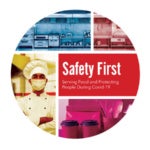
Who’s It For: Employers, Worker Advocacy, Workforce Development
What’s It For: These guidelines address common questions about COVID-19 and offer practical steps that chefs, managers and supervisors can take as they prepare to re-open their kitchens. The publication also includes information on how the virus spreads and how to reduce transmission. The guidelines give information about how workers can stay safe while preparing food, packaging meals, and during food delivery or pick-up. This guide can be used by employers as well as worker advocates and others who work closely with employers.
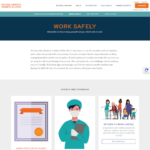
National Domestic Workers Alliance – Coronavirus: Work Safely
Who’s It For: Employers, Worker Advocacy, Workforce Development
What’s It For: This webpage offers guidance on how to protect the health and safety of domestic workers during the COVID-19 pandemic. Included are resources specifically for different domestic work occupations, such as housecleaners, nannies, and caregivers. There is guidance on how to speak with employers about returning to work and sample agreements between workers and employers to ensure safety in the workplace. These resources are geared towards domestic workers, but can also be used by worker advocates, workforce professionals, and employers to support worker safety.
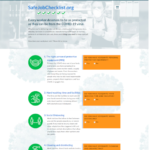
BlueGreen Alliance – SafeJobChecklist.org
Who’s It For: Employers, Policy, Worker Advocacy, Workforce Development
What’s It For: This six-question checklist for workers can help assess if their workplace is safe to return to during the COVID-19 pandemic. Responses collected by BlueGreen Alliance are used to advocate for strengthening OSHA regulations and enforcement. The checklist can be used by individual workers and shared by workforce professionals and worker advocates. The website also includes links to additional resources, such as worker health and safety trainings and safety checklists.
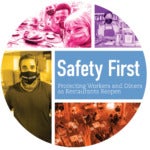
Who’s It For: Employers, Workforce Development, Worker Advocacy
What’s It For: The Food & Society Program at the Aspen Institute developed this set of one-pagers and infographics with simplified guidelines that aim to keep restaurant employees and customers safe during the COVID-19 pandemic. This toolkit – also available in Spanish and Mandarin – contains a Diner Code of Conduct that lays out safety expectations for dine-in guests, restaurant operators, and restaurant workers. There is also a resource that provides practical, affordable, and accessible guidance on ventilation systems. Although written for food service employers, organizations that work with businesses may be interested in sharing this tool with restaurant operators in their networks.
Financial and Other Supports for Workers

Internal Revenue Service – Economic Impact Payments
Who’s It For: Employers, Investing and Lending, Worker Advocacy, Workforce Development
What’s It For: The Internal Revenue Service created the Get My Payment online tracker for individuals to check the status of their economic impact payment. Users enter their Social Security Number or Individual Taxpayer Identification Number, and depending on tax filing status, may need their most recent tax return and/or banking information. The status of payments is updated once per day, overnight. Follow the link here to learn more about who is eligible, information about different types of payment status, and answers to other commonly asked questions.
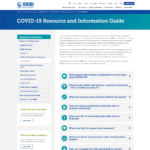
National Alliance on Mental Illness – COVID-19 Resource and Information Guide
Who’s It For: Employers, Policy, Worker Advocacy, Workforce Development
What’s It For: The National Alliance on Mental Illness (NAMI) developed this guide to answer frequently asked questions for individuals regarding the COVID-19 crisis. Resources cover topics including how to manage anxiety, how to access medication while in quarantine, and how to manage concerns about loved ones who are incarcerated. Additionally, NAMI offers guidance on how to access public healthcare benefits, financial assistance, and other supports. Employers and a range of organizations that provide support to workers might find this guide useful to share with the individuals they work with.

National Employment Law Project – Resources to Support Workers During the Coronavirus Pandemic
Who’s It For: Employers, Economic Development, Policy, Worker Advocacy, Workforce Development
What’s It For: NELP has developed a compendium of resources for workers and worker-serving organizations, which includes content about benefits eligibility during the Coronavirus pandemic. Resources provide guidance on new unemployment insurance and paid leave provisions. Several of NELP’s resources provide specific guidance for immigrant workers and NELP has created a user-friendly flow chart to help workers navigate paid sick leave and unemployment insurance systems.

Center for WorkLife Law – Coping with COVID-19 at Work and Home
Who’s It For: Employers, Economic Development, Policy, Worker Advocacy, Workforce Development
What’s It For: This guidance and resource list from the UC Hastings Center for WorkLife Law provides strategies for employers to support workers’ physical, mental, and emotional health during the COVID-19 crisis. Sections include supportive leadership strategies, managing telework, and tools for supporting mental health and wellness. Employers and organizations seeking to influence job quality for remote workers during the pandemic may find this resource particularly useful.

Good Jobs Institute – Good Jobs Lens on COVID-19 Responses
Who’s It For: Employers, Economic Development, Worker Advocacy, Workforce Development
What’s It For: The Good Jobs Institute at the Massachusetts Institute of Technology has created this clearinghouse of information, which includes a list of worker relief funds by state and industry. GJI has also aggregated a variety of news articles on impacts of the pandemic on workers, which starts on page 35.
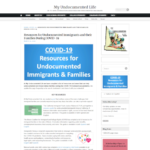
My Undocumented Life – Resources for Undocumented Immigrants and Their Families During Covid-19
Who’s It For: Worker Advocacy, Workforce Development
What’s It For: My Documented Life has compiled a resource list and policy updates to help undocumented and mixed-status families who are not covered under the current stimulus and relief legislation. Included are documents about workers’ rights in English and Spanish, a list of relief funds, and additional information related to food, financial, educational, and health-related assistance. Note that some of the resources provided are state-specific. Practitioners who serve undocumented or mixed-status families may find information included on this webpage particularly useful to share with clients.
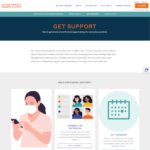
National Domestic Workers Alliance – Coronavirus: Get Support
Who’s It For: Employers, Worker Advocacy, Workforce Development
What’s It For: This webpage offers resources for domestic workers related to emotional and financial support during the pandemic. For instance, NDWA’s Care Together text hotline connects caregivers to trained coaches that can help them navigate their mental health needs and get connected to assistance. This page also offers a compilation of relief resources, organized both nationally and by state, that offer information on benefits, housing, healthcare, and more. Although created for domestic workers, this webpage can be used by a range of workers and worker advocates to assist individuals in finding support.
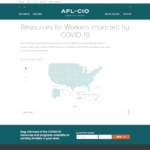
AFL-CIO – Resources for Workers Impacted by COVID-19
Who’s It For: Employers, Worker Advocacy, Workforce Development
What’s It For: This webpage compiles available supports and resources for workers by state, including housing and food assistance, health insurance, financial support, and emergency paid leave. This page can be used by workers, worker advocates, workforce professionals, and employers who are interested in supporting workers during this time.
Policy and Workers’ Rights
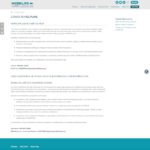
The Center for WorkLife Law – COVID-19 Resources
Who’s It For: Worker Advocacy, Workforce Development
What’s It For: The Center for WorkLife Law is offering free, fillable forms for requesting leave or accommodations due to coronavirus-related needs and a Workers’ Rights Factsheet to help workers understand details related to paid sick leave, emergency paid leave, and unemployment insurance. In addition, the center is offering a free legal helpline for workers nationwide who have questions about their workplace rights related to coronavirus. Helpline callers can connect with attorneys to receive information about how to protect their incomes, health benefits, and jobs while taking care of their families and their health during the COVID-19 crisis. These resources could be useful for worker advocates and practitioners to share with clients, including those who have been laid off, are balancing caregiving with job responsibilities, or are navigating jobs with COVID-19 exposure.
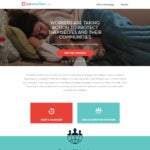
Who’s It For: Worker Advocacy
What’s It For: This online platform provides a medium for workers and their advocates to develop petitions and create campaigns to request tangible improvements in their workplaces. Included in Section 4 of the library under “worker voice,” this tool is serving as an important channel for workers to campaign for workplace protections and benefits during the COVID-19 crisis.

National Employment Law Project – Resources to Support Workers During the Coronavirus Pandemic
Who’s It For: Employers, Economic Development, Policy, Worker Advocacy, Workforce Development
What’s It For: NELP has developed a compendium of resources for workers and worker-serving organizations to help them understand workplace rights, protections, and benefits eligibility during the COVID-19 crisis. The policy briefs section includes actions state and local governments can take to support vulnerable workers during the crisis.
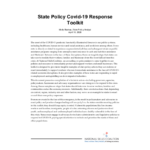
National Skills Coalition – State Policy Covid-19 Response Toolkit
Who’s It For: Policy, Worker Advocacy, Workforce Development
What’s It For: This toolkit provides tangible examples of policy actions states are undertaking to respond to the crisis, and which others can adapt to craft their own policy responses. Among these examples are steps that states can take now to serve workers, families, and communities and additional strategies for economic recovery. This toolkit may be useful for a variety of state and local leaders, including government officials, policymakers, and advocacy organizations.

PolicyLink – Let’s Take Action: Street Smart Recovery
Who’s It For: Economic Development, Investing and Lending, Policy, Workforce Development
What’s It For: This set of principles provides guidance for COVID-19 policy responses that center equity and longer-term stability and prosperity. Policymakers and practitioners seeking to support workers and job quality may be particularly interested in the sections at the bottom of the page related to investing in community infrastructure and building an equitable economy.
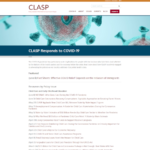
Center for Law and Social Policy – CLASP Responds to COVID-19
Who’s It For: Policy
What’s It For: CLASP has compiled resources on a range of policy issues to address the current health and economic crisis. The policy issues examined include immigration, job quality and work life, childcare and early childhood education, racial equity, and income and work supports. These policy briefs and publications can assist policymakers who are working toward an equitable recovery that centers those who were most affected by the failures of the economy even before the crisis.
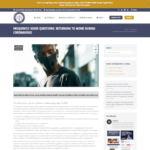
Who’s It For: Employers, Worker Advocacy, Workforce Development
What’s It For: This resource provides guidance on workers’ commonly asked questions as they return to the workplace during the pandemic. Workers may have questions about whether their employer is complying with safety laws, if they have to return to work if they don’t have childcare, and other concerns. This FAQ addresses federal as well as state and local guidance. While focused on Philadelphia, elements of the guide have relevance nationally. This resource is useful most useful for workers and those who work closely with workers, including employers, workforce development professionals, and worker advocates as they navigate the return to work.
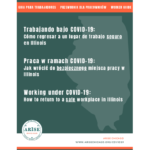
Arise Chicago – Working under COVID-19: How to return to a safe workplace in Illinois
Who’s It For: Employers, Worker Advocacy, Workforce Development
What’s It For: This resource provides guidance in three languages to address workers’ concerns about returning to work. Topics covered include requirements related to wearing masks, how workers can take safety precautions while working alongside coworkers, and more. The guide provides updated information about federal, state, and local regulations and enforcement agencies in Illinois. This publication is primarily for a worker audience and could be used by worker advocates and workforce professionals as well as by employers interested in learning more about worker concerns.
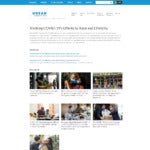
Urban Institute – Tracking COVID-19’s Effects by Race and Ethnicity
Who’s It For: Economic Development, Policy, Worker Advocacy, Workforce Development
What’s It For: This tool is designed to help policymakers and practitioners understand the extent of the pandemic’s effects on communities and inform race-conscious policies for an equitable recovery. The tracker uses the federal Household Pulse Survey to connect policymakers and practitioners to various data (e.g., on employment income loss, food insufficiency, mental health) that can be disaggregated by geography and race/ethnicity. Policymakers as well as practitioners in economic development, workforce development, and worker advocacy may find this tool useful to design strategies for an equitable recovery.
Monitoring and Supporting Businesses

Who’s It For: Employers, Economic Development, Investing and Lending, Workforce Development
What’s It For: This resource provides guidance related to seven health and safety questions that small businesses have grappled with since the start of the pandemic. For each question, the authors include practical information, examples of steps taken by other small businesses, and links to helpful resources. Topics covered include creating an equitable and inclusive environment, recognizing and responding to worker’ caregiving responsibilities, and communicating about and ensuring workplace safety. Although written for small business owners, this resource may also be useful for larger employers as well as individuals that work with businesses, including economic development, investing and lending, and workforce development professionals.
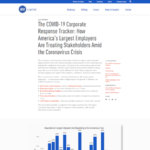
Who’s It For: Employers, Worker Advocacy, Workforce Development
What’s It For: This corporate response tracker aggregates ways the nation’s largest businesses in the US are responding to the coronavirus crisis, with links to more specific descriptions of the strategies they are undertaking. Practitioners and policymakers alike may find this tool useful for identifying examples of worker-centered business responses and vetting job opportunities for the workers they support. See Just Capital’s additional resources for examples of businesses centering worker interests in their coronavirus responses and a list of principles employers can consider as they navigate the crisis.

Good Jobs Institute – Good Jobs Lens on COVID-19 Responses
Who’s It For: Employers, Economic Development, Worker Advocacy, Workforce Development
What’s It For: The Good Jobs Institute at the Massachusetts Institute of Technology has created this clearinghouse of information in response to the crisis. The resource includes a list of company responses beginning on page 12, including examples of companies that are continuing to support employees despite store closings.
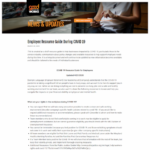
Good Business Works – Employee Resource Guide During COVID-19
Who’s It For: Employers, Worker Advocacy, Workforce Development
What’s It For: Good Business Works, based in Baltimore, developed this resource guide to help businesses impacted by COVID-19, particularly those in the service industry, communicate with employees about public policy changes and resources available to support workers. The guide includes information about workplace rights, sick leave, and unemployment insurance. It also includes links to resources including food assistance, mental health, healthcare, and childcare. While many of the resources are specific to Baltimore and Maryland, employers and organizations supporting workers could adapt this guide for their own communities.
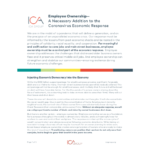
ICA Group – Employee Ownership – A Necessary Addition to the Coronavirus Economic Response
Who’s It For: Employers, Economic Development, Worker Advocacy, Workforce Development
What’s It For: In this statement on the economic response to coronavirus, ICA group describes reasons why employee ownership, which helps stabilize workers, businesses and communities, is an important business model to consider during the COVID-19 response. The document identifies policy responses to help expand employee ownership models. This resource may be particularly useful for employers, advocates, and economic development organizations.
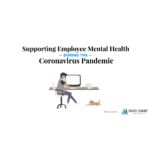
Mind Share Partners – Supporting Employee Mental Health During the Coronavirus Epidemic (Toolkit)
Who’s It For: Employers, Economic Development, Investing and Lending, Workforce Development
What’s It For: This toolkit is designed to equip organizations and businesses with strategies to support employee mental health during the coronavirus pandemic. The guide can be used as an informational document or as a presentation to leaders and managers, including human resources teams and organizational leaders. Included are recommendations to build a culture of empathy and support, links to external resources, and examples of company practices. Individuals supporting businesses or workers may also find the toolkit useful to share with employers to encourage practices that support employee mental health.
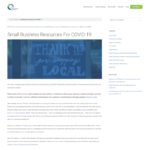
Pacific Community Ventures – Small Business Resources for COVID-19
Who’s It For: Employers, Economic Development, Investing and Lending
What’s It For: Pacific Community Ventures has compiled a list of resources to support small businesses and their workers during the COVID-19 crisis. Resources include a list of available small business grants and loans, stimulus highlights, and options for providing paid leave and other supports for workers. Small businesses can use these resources to identify financing options and strategies for retaining and supporting workers during the pandemic.
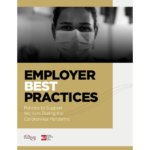
Who’s It For: Employers, Worker Advocacy, Workforce Development
What’s It For: This guide identifies policies employers can enact to support workers during the crisis. There are sections on providing emergency benefits to workers, ensuring a safe workplace, and how to support workers who are furloughed or laid off. This publication includes tangible solutions that employers can implement, such as exploring a work-sharing agreement or increasing flexibility of scheduling. While designed for employers, this guide may also be useful for worker advocates and workforce professionals who work closely with employers to support workers.

Who’s It For: Employers, Policy, Workforce Development
What’s It For: This publication provides a guide to re-opening businesses in the restaurant sector. Based on restaurant from restaurant owners across the country, the roadmap identifies ways restaurateurs can reimagine how they operate survive the crisis while operating practical, sustainable, and ethical businesses. The guide explored in greatest depth how restaurant employers can move to at least a full minimum wage for all employees. The business examples and innovative ideas have relevance for restaurant owners who are navigating the crisis and for workers and their advocates with a stake in the sector’s response to COVID-19.

Year Up/Grads of Life – Free Course: Best Practices for Managing Opportunity Talent Remotely
Who’s It For: Employers, Economic Development, Investing and Lending, Worker Advocacy, Workforce Development
What It’s For: This self-paced, mobile-friendly online training module is designed to provide frontline managers with guidance to develop, support, and retain young adult workers remotely. The module includes a remote work checklist to assess employees’ work-from-home needs. While this training is designed specifically for business managers of frontline talent, workforce and economic development organizations may find it useful to share with employers they work with to encourage more supportive and equitable supervisory practices. To download the module, you will need to complete the sign-up form.